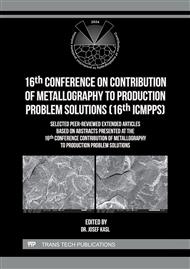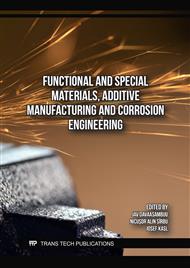p.31
p.39
p.47
p.57
p.63
p.71
p.81
p.89
p.97
Dezincification as a Cause of Damage to Brass Fittings
Abstract:
Dezincification is one of the specific types of corrosion attack on brass, very often on brass fittings in particular and is caused by the selective removal of zinc from brass, resulting in the formation of areas of spongy and brittle copper, and eventually leading to the total destruction of the component. The dezincification process is greatly facilitated by the presence of chlorine in the water and is also aided by poor aeration, low fluid circulation rates, higher temperatures and permeable deposits or coatings on the surface. This paper describes the analyses of two cases of dezincification of brass fittings, one appearing in hot water distribution pipeline and another in the nozzle of a lion's head shaped urban fountain. Although each of these components operated under different operating conditions, both were confirmed to have been damaged from this specific form of corrosion attack, often permeating the entire wall thickness.
Info:
Periodical:
Pages:
63-68
DOI:
Citation:
Online since:
November 2025
Authors:
Keywords:
Price:
Сopyright:
© 2025 Trans Tech Publications Ltd. All Rights Reserved
Share:
Citation:



